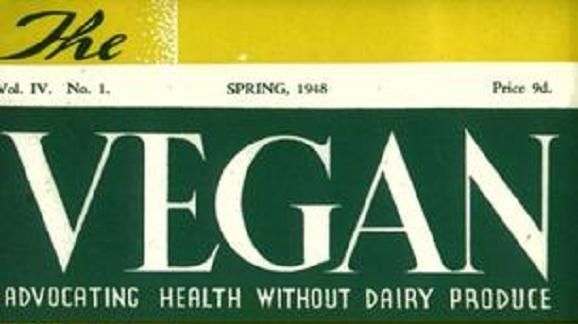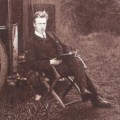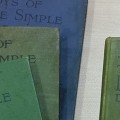The Ernest Bell Library has a passion for sharing excellent quality vegan articles / items – making them easily available to 21st C folk.
Most early books & magazines on veganism were originally only published in the hundreds or in the low-thousands of copies.
Wars, weather, insects, careless humans, etc. have combined to make many of them very hard to find.
Photo – Donald Watson reads the 1st ever copy of The Vegan News . (Picture by Joe Connolly – Veg News)
Donald Watson’s early articles are very inspiring. Donald wrote very well & with great passion.
~ No one need fear veganism leading to “a barren world” devoid of animals. Veganism would bring about the end of animal exploitation, not the end of animals. The breeding of ill-shaped, disease-ridden creatures by the million would of course end. The natural evolution of a species does not depend upon its existence in huge numbers, and it cannot be achieved so long as animals are the chattels of commerce. The requirement is to enable the animal to regain its true place in nature, and this veganism would permit. ~
Here is one of our favorite pieces of Donald’s writing. You must excuse the use of ‘he’, remembering that times have changed.
Please link & like & Tweet & G+ & copy & paste & share this very widely with friends!
Originally in –

THE PRESIDENT’S LOG
THE vegan has accepted all animal exploitation to be wrong, and he has come within measurable distance of living consistently according to this view. Not all humanitarians agree that this is the best approach to the problem either for animals or for man. There are those who believe the vegan programme would lead to the extinction of the domesticated animal, thus depriving it of further evolution. They see in veganism the prospect of what they term, “a barren world,” almost devoid of animals. They do not relish the idea of fields without flocks and herds, and some of them conceive it to be divine plan that animals should supply food and clothing to man in return for services rendered. Thus, it is argued that, instead of abolishing cruelty by abolishing animals, a better plan would be to improve the condition under which animals live, and educate on improve the conditions under which animals live, and educate on humane lines those who handle them. This cleavage of opinion is of fundamental importance to the humanitarian movement. It gives two distinct approaches to the problem of animal emancipation, and it throws open for debate what the objective of the movement shall be, the abolition of exploitation or a more beneficent system of slavery. Obviously, every reform must be welcomed which leads to the mitigation of present cruelties, but it is the position that will prevail when everything possible in this direction has been achieved that the vegan wishes to make more widely known, for this position he regards as wholly unsatisfactory to anyone genuinely seeking to live humanely. More than fine words or impracticable sentiments are needed to solve great moral problems. Where information is incomplete or where logic is bad, there is a real danger that honourable people will appear as hypocrites denouncing the cruelties of others while ignoring their own. Veganism should not be lightly criticized.
Those who would be sorry to see the fields without flocks and herds may be sure that, so long as young animals appear by the million every year, some comparable amount of traffic must be passing through the slaughter-house. Is the slaughter-house to be defended so that certain people shall be able to see the sights they like? Under the scheme for improved conditions, what would be the status of the calf? It would be hypocritical to kill it while professing to lead the world to ways of kindness and greater friendship. Kind people do not murder their friends. The laws of farming economy press ruthlessly on superfluous calves. So long as there are flesh-eaters, the bull-calves would have temporary reprieve, though how they would be castrated “with loving care” has not been stated. Would a new cowshed be any consolation to the cow at the times of her great loss? Would not her mind at this time be occupied by deeper values? Under what system of agricultural economy would old animals, worn out in the service of providing the products of their reproductive processes to man, be kept in the retirement they deserve? It is time the details of the alternative to veganism were published.
No one need fear veganism leading to “a barren world” devoid of animals. Veganism would bring about the end of animal exploitation, not the end of animals. The breeding of ill-shaped, disease-ridden creatures by the million would of course end. The natural evolution of a species does not depend upon its existence in huge numbers, and it cannot be achieved so long as animals are the chattels of commerce. The requirement is to enable the animal to regain its true place in nature, and this veganism would permit. The great economy in the use of land not required for producing animal foods would make it possible to set aside sanctuaries where animals could lead natural lives, thereby soon regaining health. Children would not be deprived of the valuable association with animals. They would be introduced to wild life, and, within certain limitations, they could keep pets. Those who are concerned that man should not fail in his self-assumed duty of assisting animals in their evolution might consider whether this assistance is good. The robust health of the wild buffalo compared with the emaciated modern cow suggests otherwise. So does the sleek, wild hog compared with the twentieth-century pig, and the wild dog with the abominable products of cross-breeding that win prizes at dog shows. Nature could manage well without such assistance.
Donald Watson – writing in 1948
Read the full issue online – the article is on pages 12 & 13.
Dorothy & Donald Watson on their wedding day
———
The Ernest Bell Library is actively preserving & sharing: –
-
items related to veg(etari)an products.
-
veg(etari)an books & other publications.
-
items related to veg(etari)an organisations.
-
items related to veg(etari)an businesses.
-
items related to animal rights organisations.
-
animal rights publications.
-
items related to humanitarian organisations.
-
humanitarian publications.
-
items related to rambling clubs run by members of the above groups & related publications.
If anyone would like to help by either Adopting or Sponsoring items in the library, please be in touch.
We are working seriously on cataloging the collection, as & when funds are available.
———
If anyone would like more information, please send an email to: –
humanitarianleague (at) outlook (dot) com
– or message me through HappyCow –
https://www.happycow.net/blog/author/JohnnySensible/
———










No Comments